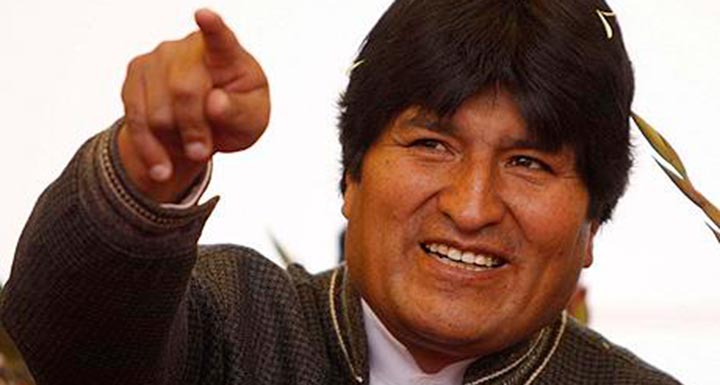
Election looms for Bolivia’s incumbent Evo Morales
Democratic Socialist, Bolivian incumbent President Juan Evo Morales Ayma, is expected to win the election on Sunday, Oct. 12.A former “cocalero” (coca farmer and activist), and continuing football (soccer) enthusiast, he has served as president of Bolivia since 2006 and has maintained close friendships with Cuba’s Fidel Castro and Venezuela’s Hugo Chavez.When Morales was elected in 2005, Bolivia’s per capita GDP was lower than it had been in 1998, but it took an upward turn after his election and continues to rise. Between 2006 and 2009 this growth was higher than at any point in the preceding 30 years.
The polling company, Tal Cual, has projected that Morales will win the election easily on Sunday with 57.3% of the vote, against his primary contender, centrist businessman Samuel Doria Medina.
In a recent campaign speech, Morales reminded supporters that on another October 12th — in 1492 — “the Europeans invaded America to dominate and subject the people of the continent. Now October 12, 2014 will be the day of the Bolivian peoples’ definitive liberation.”
Bolivia is South America’s poorest nation, although it has seen great economic advances during the Morales presidency. It is one of only two landlocked countries in South America, having lost its coastal areas and its sea access to Chile in the War of the Pacific (1879–83).
Morales, an Aymara, is the first indigenous or originario (“native” or “original”) president of Bolivia. The Aymara have occupied the Andes in western Bolivia for many hundreds of years (and possibly up to 5000 years, according to some estimates.)
Originarios make up 55% of the population of Bolivia, and include over three dozen native groups, the largest three being the Quechuas, the Aymaras and the Guarini. 15% of the population is white, and 30% is mixed (white and orginario.)In addition to governmental ceremonies, when he became president in January 2006 Morales was crowned Apu Mallku (Supreme Leader) of the Aymara as he thanked the goddess Pachamama for his victory.
In contrast to previous presidents, Morales dresses casually, often wearing garlands of coca leaves around his neck when speaking. His communications with the people are also marked by a sense of casual friendship rather than the authoritarianism of previous presidents.
Morales’ presidency has been characterized by “vivir bien,” the “good life.” During his presidency he has returned much of the nation’s resources to the people, and has dramatically improved the lives of Bolivia’s poor, especially though agrarian reform and a massive literacy campaign.
Upon his election in 2005, Bolivia’s illiteracy rate was 16%. As a result of his ambitious literacy campaign, Bolivia was declared a territory free of illiteracy by UNESCO (United Nations Educational, Scientific and Cultural Organization) in July, 2014.Morales has noted that in Bolivia “the way of doing politics has changed. For officials, politics is not a business nor a benefit … politics is a committed service…,” he declared to an applauding crowd.
(From the: OpEd News)


